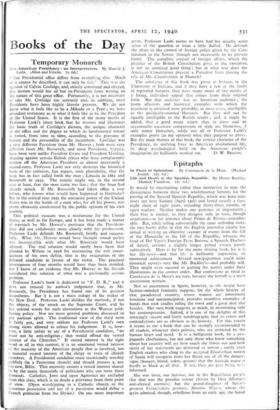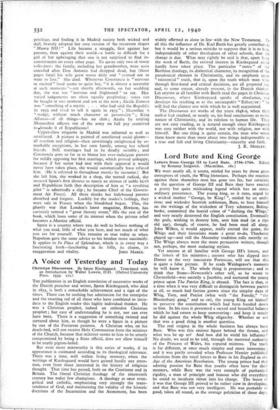Epitaphs
Life and Death 01 the Spanish Republic. By Henry Buckley. ;Hamish Hamilton. I2S. 6d.)
IT would be entertaining rather than instructive to note the divergences between these two wholehearted laments for the passing of the Second Spanish Republic, which was born nine years ago next Sunday (April 14th) and lasted exactly a fort- night short of eight years, including thirty-three months of open warfare. Neither makes any pretence of impartiality ; their bias is similar, so they disagree only in tone, though sometimes—as for instance about Primo de Rivera—consider- ably. But, while telling substantially the same orthodox story, the two books differ in that the English journalist clearly has aimed at writing an objective account of events from the fall of the Monarchy to the fall of the Republic, whereas the head of Del Vayo's Foreign Press Bureau, a Spanish Duchess of Atholl, reviews a slightly longer period almost purely subjectively. Hers is by far the more stirring book, for it is her life-story—and that life is brilliantly impressive, an emotional achievement. Several newspapermen could write historical surveys very like Mr. Buckley's—and probably will. They might even succeed in putting the names under their illustrations in the correct order. But confessions as vivid as Constancia de la Mora's are rare, because she herself is a most uncommon woman.
Not so uncommon in Spain, however, as she would have factious-minded feminists suppose, for the whole history of that paradoxical country, whose women are notoriously feminine and unemancipated, provides countless examples of hands that rock cradles ruling the roost and a great deal else besides. Her own book suggests as much, in mentioning only her contemporaries. Indeed, it is one of the delights of this amazingly Eincere and lively autobiography that its errors and contradictions are as obvious as its honesty. For this reason it seems to me a book that can be strongly recommended to all readers, whatever their politics, who are attracted by the human heart and mind. It is a belligerent book, by a pro- paganda chieftainess, but not only those who know something about her country will see how much she leaves out and how many of her statements are distorted or untrue ; surely even English readers who cling to the accepted Elizabethan notion of Spain will recognise from her fluent use of all the danger- signs (hunger, blood, yokes, groans) that the leyenda negra is hardly as black as all that. If not, they are past being mis- informed.
She was born, our heroine, not in the Republican purp!e (for that was the peculiar colour chosen by Don Alfonso's anti-clerical enemies), but the grand-daughter of Spain's greatest Conservative premier, Antonio Maura, whom she quite admired, though, rebellious from an early age, she hated
privilege, and finding it in Madrid society both wicked- and dull, bravely adopted her own version of the recurrent slogan " Maura NO ! " Life became a struggle, first against her parents, then against their world—a battle so difficult for a girl of her upbringing that one is not surprised to find in- consistencies on every other page. To quote only two of many wire-face: the family, including her grandmother, were soon consoled after Don Antonio had dropped dead, but (three pages later) his wife grew worse daily and " seemed not to want to live." She died. Whenever Constancia is "nervous or excited" food seems to quiet her, "it is almost a necessity at such moments "—yet shortly afterwards, on her wedding day, she was too "nervous and frightened' to eat. Her varied judgements are often equally perplexing : votes can be bought at one moment and not at the next ; Alcala Zamora was "something of a mystic . . . who had sold the Republic in 1933 and tried to sell it again in 1935 " ; Mussolini is "stodgy, without much character or personality " ; King Alfonso—of all things—has no chin ; Azafia by retiring Monarchist officers out of the army on full pay contrived toodenude it of Republicans!
Upper-class etiquette in Madrid was informal as well as straitlaced. A picture is painted of unrelieved social gloom— all reaction and religion—then unwittingly enlightened by re- markable exceptions, in her own family, among her school friends. Still, marriages had to be deadly suitable ; and Constancia goes so far as to blame her ever-indulgent parents for mildly opposing her first marriage, which proved unhappy, because if her suitor had met with their approval it would never have taken place, she would automatically have refused him. (He is referred to throughout merely by surname.) But she left him, she worked in a shop, she turned radical, she secured Spain's first divorce to marry an airman of noble birth and Republican faith (her description of him as "a revolting pilot" is admittedly a slip ; he became Chief of the Govern- ment Air Force). All these shocks her hidebound parents absorbed and forgave. Luckily for the reader's feelings, they were safe in France when the bloodshed began. This, the ghastly war that London's latest magazine, Horizon, has curiously termed a " great literary event," fills the rest of the book, which loses some of its interest when the private rebel becomes a-Marxist official.
Spain is a country where you do well to believe nothing of what you read, little of what you hear, and not much of what you see for yourself. This remains as true today as when Napoleon gave the same advice to his brother more succinctly. It applies to In Place of Splendour, which is in every way a fascinating book—fascinating in its folly, its charm, its



































 Previous page
Previous page